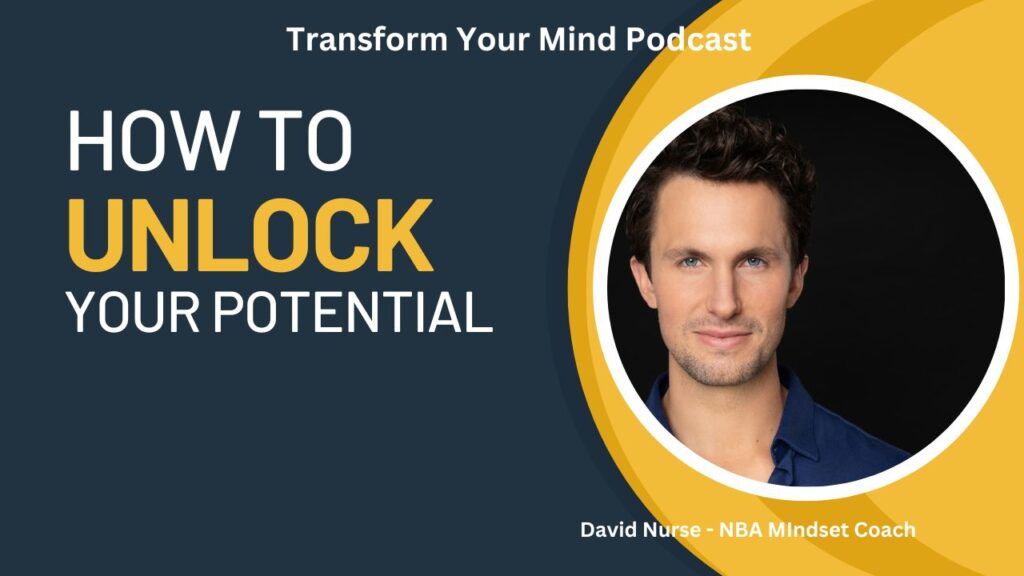David Nurse, an NBA Mindset coach and bestselling author, joins host Myrna Young to discuss the importance of a, growth mindset, to, unlock your full potential. We explore eight, archetypes of fear, that hinder action: including the burned, the blamer, and the perfectionist. David shares insights from his book “Do It: The Life-Changing Power of Taking Action” and offers practical tools for overcoming these, archetypes of fear. He emphasizes the need to embrace imperfection and take consistent action to achieve success.
Download the podcast here:
Unlock your full potential with a growth mindset
Myrna: The common thread in all your books is mindset. Why do you think a, growth mindset, is so important to our success?
David: Having a, growth mindset, is so important because really, when you break down life, it is simple. Life starts off simple. When you’re a kid, you’re just playing. You don’t have worries, stresses, anxieties.
But as you get older, get into a job, into relationships, everything becomes so complicated. But if you peel back the layers of the onion of life, it actually is very simple. And it just comes down to perspective, how you view each situation. You can’t take it all in once. It’s just step by step. It’s like taking a step forward with a flood lamp where you can only see a little bit in front of you. You can’t see the whole picture.
Having a, growth mindset, is a crucial factor in determining our success. It shapes our perspective and how we approach challenges and opportunities.
Sponsored Ad
Whether you’re a garage entrepreneur or IPO-ready, Shopify’s the only tool you need to start, run, and grow your business WITHOUT the struggle.
Shopify puts you in control of every sales channel. So whether you are selling Superfood Smoothies or Offering Organic Omega-3s, Shopify’s all-in-one eCommerce platform, got you covered.
Sign up for a one-dollar-per-month trial period at SHOPIFY.COM/transform
to take your business to the next level today.

How athletes unlock their full potential with mindset growth
Myrna: So as a mindset coach for athletes, before we go into, growth mindset , off the court, let talk about, growth mindset, on the court. Because we can transition everything in life, whether it’s having a, growth mindset, on the court, or having a, growth mindset, in the boardroom. So let’s stick with the sports analogy for a while because I never played professional sports. But let’s say I’m thinking of a mindset like Michael Jordan. I know, when he got into the league, he was benched.
Nobody thought he was good, or even Tom Brady, he was a scrawny kid. And actually, now that I started to talk, I’m thinking of all these guys. And I just finished watching the Netflix documentary on Stephen Curry biography. And of course, that’s a perfect one to look at. This scrawny little kid, and everybody is counting him out because he’s tiny, he’s small, and then he starts playing. And what he said to himself is, I’m just good at these guys. I just need to grow a little more.
So tell us about how that kind of, growth mindset, helps you go from everybody is counting you out to being the top of your game?

How Stephen Curry unlocked his full potential and changed the game
David: Yeah, absolutely. And it’s so interesting to see these top athletes to ever play their sports. A lot of them were counted out or they were underestimated. And it’s actually one of the archetypes in Do It: The Life Changing Power of Taking Action that I talk about, because we are either people who says, Why me? Others say, Why not me? Why can’t I be the best at what I’m doing? Why don’t I deserve a great life? That’s the difference between a, growth mindset vs a fixed mindset.
So it’s great that you brought up Curry, as I give this example in talks and I show this slide about when Steph Curry was coming out of college, his scouting report, and you could Google search this, you’ll just start laughing. It said, undersized, not quick enough, probably will be a backup, he’ll be lucky to even play in the NBA. And Curry goes on to transcend the way an entire sport is played, which didn’t shoot as many threes until Steph Curry came to the game. He literally took a sport that been going on for years and changed the way it was played. That is, how to overcome self-doubt and unlock your full potential.

The archetypes of inaction
Myrna: So today we want to talk a bit about the enemy of inaction, which I think is so important. Your book Do It talks about the enemy of inaction. And you said that you’ve identified eight archetypes that are the enemy of inaction. These archetypes could also be called the, fear of failure. The first one is The Burned.
I’m assuming that you mean that someone burned me, so I’m not going to do anything. Which is the, enemy of progress. Another one is The Blamer, I know that one because even this morning, I was telling my son to stop going around blaming others, it’s one of the worst things that you can do. And then there is The perfectionist. The people with, type A personality. I understand, The Blamer, and, The Perfectionist. Not so much about, The Burned. So talk to us about these eight, archetypes of fear, that are the enemies of inaction.

To overcome the enemy of inaction we must release fear
David: So the, enemy of inaction, is fear. Ultimately, it is, fear of uncertainty. It’s fear of failure. We don’t take action because we don’t know what’s on the other side of that action. If you were guaranteed results, you would do that. But it’s uncertain. So there’s actually eight, archetypes of fear, that I outlined, those are just the top three. I’ll just go through the eight.
If you’re struggling, if you’re held back, if you’re stuck, you can understand why and be able to break through that and take action. So the archetypes are the allodoxaphobia, which is just a cool way to say, fear of other people’s opinions.
The following archetypes are the enemy of inaction. We need to recognize them to, unlock our full potential.

The archetypes of inaction
- The Burned archetype refers to individuals who have been hurt or disappointed in the past and are afraid to take action again. They may have experienced failure or rejection, and this has created a, fear of failure. If you are going to, unlock your full potential, you need to start addressing this by separating the past from the present and adopting a reverse alter ego. By giving the past a silly name, we can distance ourselves from the negative experiences and move forward with a fresh perspective.
2. The Blamer archetype is characterized by individuals who constantly blame others for their current situation. We can never, unlock our full potential, if we refuse to take responsibility for our actions and believe that external factors are the cause of their lack of progress. I emphasize the importance of personal accountability and encourages individuals to take ownership of their choices and outcomes.
3. The Perfectionist archetype is driven by the need for everything to be perfect. Type A personalities, fall into to, the perfectionist archetype. These individuals set impossibly high standards for themselves and are often paralyzed by the, fear of failure. You can never, unlock your full potential, if you have a, fear of failure. I advise my clients to embrace the, 90% theory, which allows for imperfection and acknowledges that nothing will ever be perfect. By focusing on giving 90% effort and accepting that mistakes are part of the learning process, individuals can overcome the, perfectionist mindset, and take action.
The other archetypes of inaction
4. The Believer archetype, organize their lives around their belief systems. When asked why they believe in a certain way, many Believers will simply reply, “Because it’s true.” They have their own way of coming to conclusions and these ways often defy reason and/or are difficult to convey because they are based on a feeling.is kind of interesting. Check out, the Believer Archetype, on Myers Briggs .
5. The Inopportune archetype , which means you think you’re either too old or too young. Timing is just not right. Tjis becomes the reason for inaction.
6. The introvert believes he is introverted, so he can’t go out and talk to people. Introverted or extroverted has nothing to do with whether you talk to people or not? It’s just how you recharge. Do you recharge by yourself or do you recharge with others?
Ad
Did you know that it typically takes most podcasters 10 to 15 hours to edit a one-hour show? And that does not include show nates and transcripts.
“One of the best things I ever did was start this podcast. It’s led to the many life-changing conversations and the amazing community of mindset fans that’s formed around it.
But it also took up a lot of my time in post-production, that is until I found the Alitu podcasting software.
If you head on over to blog.myhelps.us/alitu
you’ll find a great little web app designed to make processing, editing and publishing your podcast super-easy.
.Alitu lets you record, edit & host your podcast with one tool.
Alitu automatically generates episode transcripts for you, and you can publish and distribute your show across the web through its very own hosting feature, too.
Get started with Alitu on the monthly plan of $38. Start for free with a seven-day free trial. So, why not give it a try.
Head on over to blog.myhelps.us/Alitu to get started

7. The scarcity archetype, where you have a, scarcity mindset. There’s only one slice of the pie that you feel like you just have to hold on to all you got and you can’t share anything with anybody else, because if you do, it’s all going to be gone.
8. The distracted archetype, and I don’t even mean by distracted of like our phones or the notifications or all these things that we have of being constantly on in this world that we live in. But even more the distraction of not knowing what your vision, your mission, your purpose is. And that’s your, enemy of inaction. The enemy of, unlocking your potential.
Conclusion
In conclusion, unlocking our full potential, requires a shift in mindset. We must, overcome the enemy of inaction, which is often fueled by fear and negative thought patterns. By addressing the burned, blamer, and perfectionist archetypes, we can break free from these limiting beliefs and take action towards our goals. Remember, the mind is a powerful tool, and by harnessing its potential, we can transform our lives and achieve greatness.
Additional Resources
https://myhelps.us/shamelessly-persistent-keep-knocking-until-door-opened/









